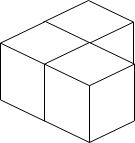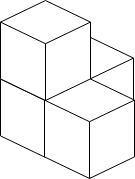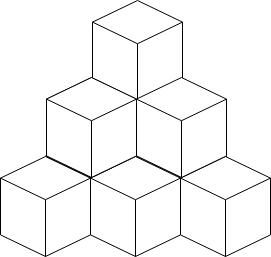LeetCode in Kotlin
1739. Building Boxes
Hard
You have a cubic storeroom where the width, length, and height of the room are all equal to n units. You are asked to place n boxes in this room where each box is a cube of unit side length. There are however some rules to placing the boxes:
- You can place the boxes anywhere on the floor.
- If box
xis placed on top of the boxy, then each side of the four vertical sides of the boxymust either be adjacent to another box or to a wall.
Given an integer n, return the minimum possible number of boxes touching the floor.
Example 1:

Input: n = 3
Output: 3
Explanation: The figure above is for the placement of the three boxes. These boxes are placed in the corner of the room, where the corner is on the left side.
Example 2:

Input: n = 4
Output: 3
Explanation: The figure above is for the placement of the four boxes. These boxes are placed in the corner of the room, where the corner is on the left side.
Example 3:

Input: n = 10
Output: 6
Explanation: The figure above is for the placement of the ten boxes. These boxes are placed in the corner of the room, where the corner is on the back side.
Constraints:
1 <= n <= 109
Solution
class Solution {
fun minimumBoxes(n: Int): Int {
val k: Int = findLargestTetrahedralNotGreaterThan(n)
val used: Int = tetrahedral(k)
val floor: Int = triangular(k)
val unused: Int = (n - used)
if (unused == 0) {
return floor
}
val r: Int = findSmallestTriangularNotLessThan(unused)
return (floor + r)
}
private fun findLargestTetrahedralNotGreaterThan(te: Int): Int {
var a: Int = Math.ceil(Math.pow(product(6, te.toLong()).toDouble(), ONE_THIRD)).toInt()
while (tetrahedral(a) > te) {
a--
}
return a
}
private fun findSmallestTriangularNotLessThan(t: Int): Int {
var a: Int = -1 + Math.floor(Math.sqrt(product(t.toLong(), 2).toDouble())).toInt()
while (triangular(a) < t) {
a++
}
return a
}
private fun tetrahedral(a: Int): Int {
return ratio(product(a.toLong(), (a + 1).toLong(), (a + 2).toLong()), 6).toInt()
}
private fun triangular(a: Int): Int {
return ratio(product(a.toLong(), (a + 1).toLong()), 2).toInt()
}
private fun product(vararg vals: Long): Long {
var product = 1L
for (`val`: Long in vals) {
product *= `val`
}
return product
}
private fun ratio(a: Long, b: Long): Long {
return (a / b)
}
companion object {
val ONE_THIRD: Double = 1.0 / 3.0
}
}

